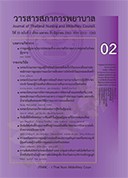Factors Influencing Depressive Symptoms in Caregivers of Older Adults with Dementia
Keywords:
depressive symptoms, preparedness, health status, older adult with dementia, caregiverAbstract
Abstract
Objective: To study the influences of dementia severity, comorbidities of older adults with dementia, comorbidities of caregivers, health status of caregivers, preparedness for family care, and mutuality between older adults and caregivers on depressive symptoms among caregivers of older adults with dementia.
Design: Descriptive predictive study
Methodology: A sample of 122 caregivers who had been taking care of older adults with dementia at least 14 hours/week for at least 3 months was recruited at a memory clinic of one tertiary hospital in Bangkok. Data were collected using questionnaires for demographic data, Charlson comorbidity index, health condition perception, preparedness for family care, mutuality between older adults and caregivers and Center for Epidemiologic Studies Depression scale. Data were analyzed using multiple linear regression.
Result: The older adults had mild level of dementia and moderate level of comorbidity severity. The caregivers of the older adults with dementia were descendants and had no comorbidity with moderate level of health status. They had moderate level of preparedness, a rather high level of mutuality and low depressive symptoms. Preparedness for family care and health status of caregivers were found as signifcant factors which could explain for 35.4% of variance (Adjust R2=0.354, F=9.277, p=0.000) However, level of dementia, comorbidities of older adults with dementia, comorbidities of caregivers and mutuality did not signifcantly predict depressive symptoms among caregivers of older adults with dementia.
Recommendations: Preparedness and health status of caregivers had influences on depressive symptoms among caregivers of older adults with dementia. The higher level of preparedness and the better health status of caregivers, they are more likely to have less depressive symptoms. Therefore, nurses should prepare caregivers to being ready and promote their health status in order to prevent depressive symptoms from caring for the older adults with dementia.
Downloads
References
Alzheimer’s Association. 2019 Alzheimer’s disease facts and fgures. Alzheimer Dement 2019;
(3):321-87.
Schoenmakers B, Buntinx F, Delepeleire J. Factors determining the impact of caregiving on caregivers
of elderly patients with dementia. Maturitas 2010;66(2):191-200.
Ondee P, Panitrat R, Pongthavornkamol K, Senanarong V, Harvath TA, Nittayasudhi D. Factors predicting
depression among caregivers of persons with dementia. Pacifc Rim Int J Nurs Res 2013;17(2):167-80.
Omranifard V, Haghighizadeh E, Akouchekian S. Depression in main caregivers of dementia patients:
prevalence and predictors. Adv Biomed Res [serial online] 2018 [cited 2018 Nov 12]; 7: 34. Available
from: https://www.advbiores.net/text.asp?2018/7/1/34/225924
Sasipinyo D. The prevalence of depression in caregivers of dementia patients at dementia clinic,
King Chulalongkorn Memorial hospital. Chula Med Bull 2019;1(2):177-89.
Schulz R, O’Brien AT, Bookwala J, Fleissner K. Psychiatric and physical morbidity effects of dementia
caregiving: prevalence, correlates, and causes. Gerontologist 1995;35(6):771-91.
Piercy KW, Fauth EB, Norton MC, Pfster R, Corcoran CD, Rabins PV, et al. Predictors of
dementia caregiver depressive symptoms in a population: the cache country dementia progression
study. J Gerontol B Psychol Sci Soc Sci 2013;68(6):921-6.
Kashiwagi S, Tomiya N, Sandoval F. Factors associated with depression amongst family caregivers
involved in care for community-dwelling persons of middle age and older: based on data from Indonesia
family life survey. IISTE 2016;6(5):24-32.
Shyu YI, Yang CT, Huang CC, Kuo HC, Chen ST, Hsu WC. Influences of mutuality, preparedness, and
balance on caregivers of patients with dementia. J Nurs Res 2010;18(3):155–63.
Sutthilak C, Wirojratana V, Puwarawuttipanit W, Cheewakriengkrai L. Factors predicting health status
on caregivers of elderly people with dementia. Journal of The Royal Thai Army Nurses 2018;19(1):191-200.
(in Thai)
Archbold PG, Stewart BJ, Miller LL, Harvath TA, Greenlick MR, Buren LV, et al. The PREP system
of nursing intervention: a pilot test with families caring for older members. Res Nurs Health
;18(1):3-16.
Wirojratana V. Development of the Thai Family Care Inventory [Doctoral dissertation]. Portland: Oregon
Health & Science University; 2002.
Griffths J, Putthioi S, Pongsuksri M. The General Practitioner Assessment of Cognition; GP-COG
(Thai version): validity and reliability. In: 9th Pan-Pacifc Conference on Rehabilitation cum 21st annual congress of Gerontology; 2014 November 29-30; Hong Kong. Kowloon: The Hong Kong Polytechnic University; 2014. pp. B65.
Radloff LS. The CES-D scale: a self-report depression scale for research in the general population.
Appl Psycho Meas 1977;1:385-401.
Kuptniratsaikul V, Pekuman P. The study of the Center for Epidemiologic Studies-Depression scale
(CES-D) in Thai people. Journal of Thai Rehabilitation Medicine 1997;49(5):1-9. (in Thai)
Charlson ME, Charlson RE, Peterson JC, Marinopoulos SS, Briggs WM, Hollenberg JP. The Charlson
Comorbidity Index is adapted to predict costs of chronic disease in primary care patients. J Clin
Epidemiol 2008;61(12):1234-40.
Longphasuk N, Monkong S, Sirapo-ngam Y. Health conditions and self-care activities of older caregivers
caring for bedridden older adults. Thai Journal of Nursing and MIdwifery Council 2018;33(2):97-
(in Thai)
Archbold PG, Stewart BJ, Greenlick MR, Harvath T. Mutuality and preparedness as predictors of caregiver
role strain. Res Nurs Health 1990;13:375-384.
Gray JR, Grove SK, Sutherland S. Burns and Grove’s the practice of nursing research: appraisal, synthesis,
and generation of evidence. 8th. Philadelphia; 2017.
Bednarek A, Mojs E, Krawczyk-Wasielewska A, G odowska K, Samborski W, Lisi ski P,
et al. Correlation between depression and burden observed in informal caregivers of people suffering
from dementia with time spent on caregiving and dementia severity. Eur Rev Med Pharmacol Sci
;20(1):59-63.
Sasat S. Gerontological nursing: common problems and caring guideline. 3rded. Bangkok: CU Print;
(in Thai)
Sangsarawad C, Lagampan S, Chansirikarnjana S, Intarasombat P. Determinants of the quality of life
among elderly people with dementia. The Journal of Gerontology and Geriatric Medicine 2011;12(3):23-34. (in Thai)
Ball V, Snow AL, Steele AB, Morgan RO, Davila J, Wilson N, et al. Quality of relationships as a predictor
of psychosocial functioning in patients with dementia. J Geriatr Psychiatry Neurol 2010;23(2):109-14.
Cucciare MA, Gray H, Azar A, Jimenez D, GallagherThompson D. Exploring the relationship between physical health, depressive symptoms, and depression diagnoses in Hispanic dementia caregivers. Aging Ment Health 2010;14(3):274-82.








